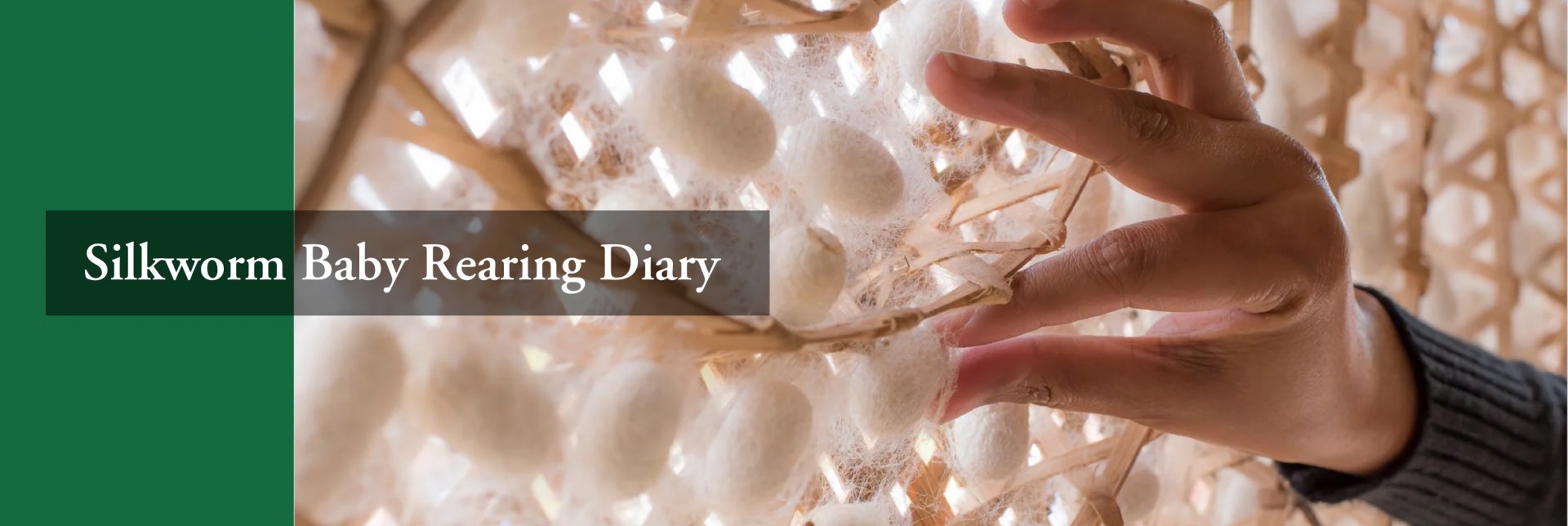Silkworm Baby Rearing Diary
Children were taught about the life journey of silkworms in kindergarten, after school, they shared the new knowledge with their family members and wanted to keep their own silkworms. Spring arrived, life's alive in everything, to satisfy children's curiosity and retrieve their childishness, parents have taken the silkworms and mulberry leaves home.
As an important component of Chinese Civilization, Sericulture has a long history— the evidence which founded by archaeologists in Shanxi province (山西省) confirmed that it has appeared about 5,000 years in China. Chinese People started to feed silkworm before Xia Dynasty (夏朝). To Shang Dynasty (商代), sericulture became one of the elements of fete and divination. Ritual of the silkworm god(先蠶禮, the silkworm god 先蠶 is the god who taught Chinese people to feed silkworm, gathered the raw silk and woven into the clothes in ancient legend) turned into the important ritual of nation during Zhou Dynasty (周朝). Since Qin and Han Dynasty (秦漢時期), the technique and scale of sericulture improved continually, then peaked in Ming and Qing Dynasty (明清時期). Silk, which was one of the Chinese unique products and be called as "Cultural Ambassadors", its production started from sericulture. The life journey of silkworms can be divided into five growth stages. The silkworm babies that the children received are already in their fourth phase. Children used biscuit paper boxes to build the cosy nest for silkworms with the help of parents, thirteen somites form their cool and soft body which with eight pairs of legs. The keen sense of smell and touch help them to find the fresh mulberry leaves. Then they will use their feet to grab the leaves and feasted on the food with the rustle. Sometimes they were full, they raised the head and looked around, just like they were doing neck exercises!

Since then, the children were always concern themselves with the silkworms. After the silkworms exuviated in the fourth instar, they have a bigger appetite in the fifth instar. Parents started to find more mulberry leaves to filled silkworms' bellies, Sharing the fun of silkworms feeding with schoolmates became the important thing that the children were looking forward to. In the process, the whole family have become the silkworm keeper, to manage all of silkworms' daily needs. The poop of silkworm is a type of Chinese herbal medicine called "Silkworm sand" with the faint scent of mulberry leaves, it has been used for treating rheumatism. Whether in the textile industry, the food industry, or the medical industry, the silk of silkworms plays an important role. Just like the old saying "The whole body of silkworm is valuable." Their entire lives are devoted to serving humans.

When the silkworms grew to 7 centimeter in length and became translucent, they started to spin a layer of cocoon. The children anxiously asked when they found the silkworms became weak and lost their appetite "Are the babies ill? Will they cocoon? Do they feel lonely?" Then, the children would hold silkworms up and talk to them apprehensively and checked the situation of silkworms every morning. The silk that the silkworms made were sparkled under the sunshine, the children reached out and want to touch the silk repeatedly but withdrew the hand to avoid damaging the "new home" of silkworms every time. After a few days, the silkworms have finished their cocoon. Children felt lonely and revived their memories with silkworms.


After the silkworms broken the cocoon into the moth are the stage of mating and oviposition, then they have reached the end of the life. The life cycle of silkworms just like the epitome of human being— birth, death, and rebirth. This experience gave children and us a new insight of life, just like the poem described "Spring silkworm till its death spins silk (春蠶到死絲方盡)."
Major Reference
1、孫傑:〈絲綢 一絲一縷皆中國〉,《孔子學院》,第43期,(2016),頁7-13。
2、章林:〈蠶桑與絲綢〉,中國民族宗教網,2023年1月21日,http://www.mzb.com.cn/html/report/23012109-1.htm,2023年9月27日讀取。
All articles/videos are prohibited from reproducing without the permission of the copyright holder.




Welcome to leave a message:
Please Sign In/Sign Up as a member and leave a message